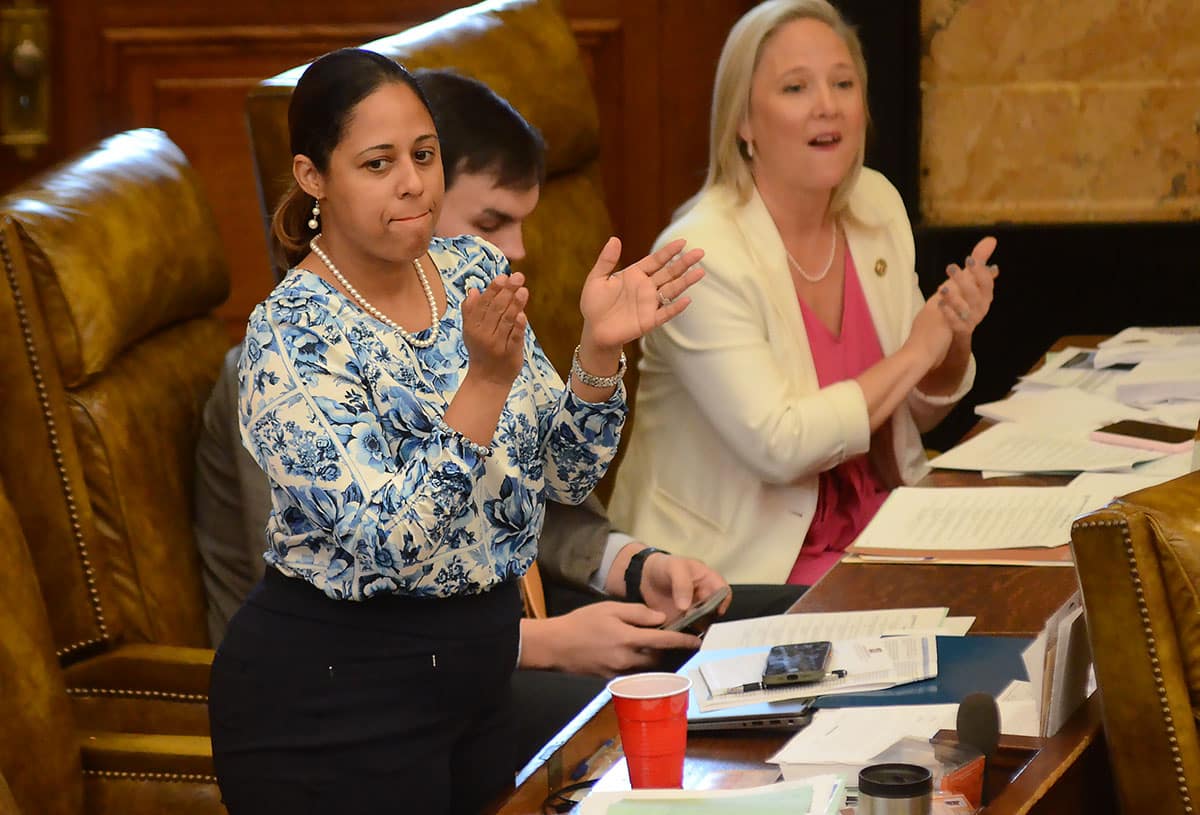Mississippi Today
Q&A with Rep. Zakiya Summers on Right to Contraception Act

Note: This Q&A first published in Mississippi Today's InformHer newsletter. Subscribe to our free women and girls newsletter to read stories like this monthly.
Rep. Zakiya Summers, D-Jackson, is a second-term lawmaker who has been outspoken on the need for Medicaid expansion and on a number of women's health issues. Summers authored House Bill 1154 this session to ensure access to contraception.
After the fall of Roe v. Wade in June of last year, the federal constitutional right to contraception became a topic of national discussion. U.S. Supreme Court Justice Clarence Thomas called on the Supreme Court to review Griswold v. Connecticut, the landmark decision in which the court ruled that married couples have the right to access contraception.
Soon after, 195 Republican members of the U.S. Congress, including every Mississippi Republican in the House, voted against the “Right to Contraception Act,” which would have codified the right to contraception under federal law. Since then, some state legislatures have introduced bills to restrict access to contraceptives or allowed health providers to refuse to provide or cover contraception.
The Dobbs ruling made access to contraception more critical in Mississippi, which has among the country's highest rates of unplanned pregnancy and maternal mortality and the highest rate of infant mortality.
Gov. Tate Reeves has been unclear about his stance on contraception, refusing to rule out contraceptive bans or define what he considers contraception versus “abortion-inducing” pills and devices.
Mississippi Today spoke with Summers hours before the House passed a Medicaid expansion bill and the day before a presumptive eligibility bill, co-authored by Summers, was sent to the governor for approval.
Editor's note: This Q&A has been edited for length and clarity.
Mississippi Today: Can you tell us a little bit about yourself? What have you been focused on in past sessions and what's on your agenda this session?
Zakiya Summers: I am Zakiya Summers. I serve as state representative for House District 68, which covers Hinds and Rankin counties. I'm in my second term, so this is my fifth session. The first term was a bit of a learning curve even though I had been a part of the policy advocacy table for a number of years, it's different when you're in the belly of the beast. I really prioritized five issue areas: education, election reform, increasing access to health care, infrastructure and economic development. We were pretty successful during the first term – we got a few things passed through our work with colleagues across the aisle.
My proudest moment has been to be in a position where I was able to cast my vote to take down the Confederate flag and put up a new flag. It was very personal for me because the flag was a very traumatizing symbol, even for my husband. I was honored and privileged to be able to do that after many, many years, decades, of a lot of different people who were working on that issue for a long time.
Another bill that I'm really proud of is a law that now implements computer science curriculum in K-12 education. I thought that was extremely important because I understand that in order for us to do some of the things that Gov. Reeves talked about in his State of the State around really helping to build wealth and prosperity in the state of Mississippi, we have to prepare young people for the jobs of the future. And I know that jobs of the future will be heavily technology-based. I mean, we saw that in the huge economic development deal that we did at the beginning of the session with Amazon web services.
This year, I'm pushing the Right to Contraception Act. I'm also pushing a bill called the Crown Act which would prohibit hair discrimination in schools and I think it's gaining some momentum.
MT: Can you tell us a little bit about the story behind the Right to Contraception Act?
ZS: The Right to Contraception Act is really an effort to be proactive and to raise the bar, elevate the message around preventative health. We've received so many dismal reports from health experts, from our medical health officer, from out chief health officer about the really negative, unfortunate health outcomes and health disparities we have in the state of Mississippi. Mississippi is 50th on the list in the entire country with those health disparities. And we know that when families have access to the things they need they can make the best decisions for their lives and for their families and for their future. And so we see the Right to Contraception Act as an opportunity for Mississippians to have unfettered access to contraception if they would like to have that and it will help them to make the best decisions for them.
MT: It might seem far-fetched to some people that Mississippians could lose access to contraception. But we've seen with recent events – IVF in Alabama, for instance – that liberties we take for granted aren't always guaranteed. Why is it important in the Legislature to predict what may happen down the road and get ahead of it with policies and laws that preserve the liberties we take for granted?
ZS: It's so important, especially when you see what's happening across the landscape. We never would have thought that Roe v. Wade would be rolled back but elections have consequences. And when you don't vote or you don't vote for your best interests, you end up getting people in positions that can make these appointments to these courts and they end up rolling back precedents that we've had for decades. And it becomes more than just partisan politics – it becomes a matter of life and death.
We've seen with the overturning of Roe v. Wade that individuals no longer have the ability to make their own decisions about their health and their bodies. And then we also saw as a result of that decision an opinion by Supreme Court Justice Thomas that even hinted at removing the right to contraception. And then, when our governor was questioned about it, he was not clear about how he would move or what he would support or oppose around the issue.
You mentioned the IVF decision that came out of Alabama just last week. And now we're talking about if an embryo is a person. So we're beginning to see these – I really think they're unintended consequences. Because I really don't think that when the fight was around getting rid of Roe v. Wade that they even had the thought that these kinds of things would begin to roll out. And so what we want to do in Mississippi is we want to be pro-life all the way. And I actually see the Right to Contraception Act as a pro-life measure, because if we want to make sure that our boys and girls, men, women, families, are set up in the very best situation that they can possibly be in, where they can remain in a state that's their home, but provides the conditions by which they're not just surviving but thriving, then we should support the Right to Contraception Act because that is an important piece to this equation for them to be able to make those healthy decision for themselves.
MT: You helped author House Bill 539 on presumptive eligibility for pregnant women. It passed the House a few weeks ago now – quite early on in the session. Are you feeling hopeful that it will have more success this year than last year?
ZS: I am feeling incredibly optimistic this session. We have a speaker now, Speaker Jason White, that has encouraged and urged all of us to work on a bipartisan level. We are seeing our colleagues across the aisle actually bring us into conversations on legislation that we have been introducing for a number of years that are finally getting some light and attention. I think the energy has changed in the House and I really appreciate the Speaker, as well as the chairmen and chairwomen we have on committees right now, wanting to work with the Democrats. Because, I mean, let's face it, we are in a super minority – we get that, we understand that. But we believe that Mississippians want us to work together, because the best ideas and the best solutions to the problems many of us face come from when we can get together and hash it out.
We know that we may not get everything we want. But let's try to build some consensus and at least commit to working together as we move forward. And then Speaker White has also been very adamant about working with leadership in the Senate, as well. So that we can build a positive force on both ends of the Capitol and hopefully get some stuff to the governor's desk that will be historic for the state of Mississippi.
MT: There are a couple of bills on chemical endangerment this year, which would allow for prosecution of pregnant women who take drugs during pregnancy. The author of one of the bills says it would not prosecute women for taking the abortion pill – that abortion pills are protected because they are prescriptions. But the author of the other chemical endangerment bill said that could be open for debate. What do you make of the obscurity in this legislation and do you think that obscurity is dangerous?
ZS: I think with any bill where you're getting one perspective that's different from the other, it's something that we need to watch. Because it could put our autonomy at risk. And we need to know how is this going to impact the folks that live in our communities on whether or not they can access the things they need.
And, you know, we don't represent the demographics of our state here in the Legislature. Our population, we have more women than we do men, but the percentage here, in the House as well as the Senate, is very, very low. I think we have a total of 17 women who serve as legislators. Now that doesn't necessarily mean that because you're a woman and you serve as a legislator that you're going to do what's best for women. But what I will say is that a man that has never had a uterus and has never carried a child and doesn't understand the risks and also the fear that surrounds the ability and process of getting pregnant and having a child, it's a real thing. When you look at the rates of our maternal mortality and infant mortality in the state, it's something that our young women have in the back of their minds. And they want to be able to survive this pregnancy and also have a healthy child as an outcome. And then in addition to that be able to raise a child in a healthy environment. And so what we shouldn't be doing, especially coming from a man, a man should not be telling women what to do with their bodies. I mean, that's just the bottom line. And we should be able to get together, work with women, and work with experts that can give us the knowledge and the facts around what is good and what's available for women and their families. Instead of doing everything we can to be punitive against women, we should be trying to help them be successful in the state.
MT: Are there any other bills you're keeping an eye on? How are you feeling about Medicaid expansion this year?
ZS: I am so overwhelmed with Medicaid expansion. It passed out of committee yesterday and it's going to come up in the House today. This is the first time in 10 years that we've even seen Medicaid expansion be put on the table. It's a huge deal for the state of Mississippi for all the reasons I've talked about today with the health disparities and the negative health outcomes we have in the state. So I'm very excited about that. I am hopeful that our colleagues in the Senate will stand strong and also support this legislation and if, and I say if, a veto were to happen, that we also stand united and override that veto. Because the working families in our communities and our districts across the state are depending on this. They're depending on us to do the right thing, to give them a chance to work, be healthy, take care of themselves, take care of their families, and achieve that dream of prosperity that Gov. Reeves talked about this week.
This article first appeared on Mississippi Today and is republished here under a Creative Commons license.
Mississippi Today
Veiled accusations fly in hearing over disappearance and death of Jackson man
Following a contentious hearing Tuesday in the disappearance and death of a Jackson man, a Hinds County judge said he intends to keep an injunction in place until the state can complete an autopsy.
Chancery Court Judge Dewayne Thomas heard arguments Tuesday morning in a lawsuit to determine who will decide what happens to the remains of Belhaven Heights resident Dau Mabil and whether an independent autopsy can happen.
Mabil, 33, disappeared March 25, and three weeks later, his body was found over 50 miles away in the Pearl River in Lawrence County.
The day that a preliminary autopsy determined that the body was that of Mabil, his brother, Bul, filed the lawsuit against Mabil's wife, Karissa Bowley, and state investigators: the Capitol Police and the State Crime Lab. None of the defendants said they were notified of the April 18 hearing when Thomas entered the emergency temporary restraining order and preliminary injunction.

Bul Mabil and his attorneys have raised suspicions about what led to Dau Mabil's death, and they argue that an independent autopsy is the only way to be certain there was no foul play – contrary to what the Lawrence County sheriff has said. U.S. Rep. Bennie Thompson has requested the Justice Department investigate.
On Tuesday, that led to pointed questions by Bul Mabil's attorney Lisa Ross to Bowley, who testified for nearly two hours.
Ross' questions included implications about whether Bowley or some of her family members had something to do with Mabil's disappearance, including introduction of text message evidence showing that the couple had fought and spent a few days apart in the weeks leading up to him going missing.
The questioning culminated when Paloma Wu, who is representing Bowley, asked if she killed Mabil or knew who did, and Bowley said no.

Ross also asked Bowley other reasons why her husband went missing, including past arguments they had, money, whether Mabil was suicidal and why she didn't accompany him on March 25.
Throughout testimony, Wu made multiple objections to Ross' questioning, asking about how they were relevant, saying they were hearsay and they should be stricken from the record. Judge Thomas allowed most of the questions.
“This has become a performance for free-wheeling defamation,” Wu said about the attorney's questioning. “This is not a murder trial against Karissa.”
To date, there has been no evidence of foul play and nobody has been criminally charged.
Bowley said she would have agreed to an independent autopsy if Bul Mabil had just asked, and she would have preferred the family to have a conversation rather than having to go to court.
Multiple times, Ross asked Bowley if she would agree to make the results of the state's autopsy public and to allow an independent autopsy on Mabil's body.
“I have no reason not to,” Bowley replied.
In court filings, Bul Mabil argued he should be considered the next of kin who can make decisions about his brother's body rather than his brother's wife. Wu said the state law is clear that a surviving spouse takes precedence as next of kin over siblings and other descendants.
After the hearing, Ross said her questions highlight how there is no Mississippi case law that defines who counts as a surviving spouse. In other states, she found that courts have ruled that an estranged or separated spouse does not count as next of kin.
A motion by Capitol Police and the State Crime Lab filed late last week asks the judge to dismiss the temporary restraining order and lawsuit complaint.
Thomas said he plans to issue an order Thursday to address pending motions and issues raised in the hearing, and he said he will release a separate order addressing Bowley's request to be added as a plaintiff.
This article first appeared on Mississippi Today and is republished here under a Creative Commons license.
Mississippi Today
The Pulse: Mississippians rally for full Medicaid expansion

Rev. Reginald Buckley joined hundreds of doctors, clergy, and Mississippians from over 35 communities at the Capitol in Jackson for a “Full Expansion Day” rally, urging legislators to expand Medicaid coverage under the federal Affordable Care Act on Tuesday, April 16, 2024.
READ MORE: ‘A matter of life and death': Hundreds rally at Capitol for full Medicaid expansion

Mississippi health news you can't get anywhere else.
This article first appeared on Mississippi Today and is republished here under a Creative Commons license.
Mississippi Today
Senate ushers in new college board appointees with few questions asked about higher education
Hearings for new members of the governing board of Mississippi's public universities last week were in a small, out-of-the-way room on the fourth floor of the Capitol that does not have live-streaming capabilities.
Senate committee meetings are usually broadcast on YouTube, a point of pride for the chamber where lawmakers occasionally mock the Mississippi House for not doing the same.
But the failure to broadcast the hearings for Gov. Tate Reeves' nominees to the Institutions of Higher Learning Board of Trustees means there is no way for students, faculty or staff who could not make it to Jackson to observe the proceedings to know what occurred, even as, according to multiple senators, the meeting was standing-room-only.
This is noteworthy because the IHL Board meetings are pro forma; the 12 trustees almost always vote in lock-step and rarely discuss policy proposals during regular open meetings in Jackson. The Senate has advise-and-consent power on the governor's nominees, so its confirmation hearings are one of the few times trustees, who serve nine-year terms, must take questions from representatives of the public.
Though Reeves' four nominees were asked by Sen. Nicole Boyd, R-Oxford, the chair of the Senate Colleges and Universities Committee, about why they wanted to serve on the IHL board, multiple senators told Mississippi Today they could not recall, or did not ask, the appointees any questions about higher education issues. The nominees were confirmed by the full Senate with no questions on Sunday afternoon.
The committee hearing occurred on April 23 at 1 p.m. in room 407, a small room tucked away in a corner of the fourth floor observation balcony, behind a scanner, a security guard, an assistant's desk and a sign that says “NO ADMITTANCE Senate Staff Only.”

“I really don't think I thought about how it didn't have live-streaming capabilities,” said Boyd, who is also a Senate conferee embroiled in the contentious Medicaid expansion negotiations. “There wasn't anything sinister about it.”
Boyd added that before the committee hearing, she and the chair of the House Colleges and Universities Committee had interviewed the four nominees. She said she was excited about the different experiences the new trustees would bring to the board.
“Our committee really wants to work closely with the college board and the community college board,” Boyd said. “I wish there were cameras in there because it's more of an intimate setting. I would like to have more meetings in there … just because the room is small and you're around the table.”
New IHL board member Jerry Griffith, a retired IRS agent who previously served on the Gaming Commission, said he was even confused if the hearing was public or private when he was contacted by Mississippi Today.
“Please forgive me, I'm not trying to be ugly or anything, but I'm so new to the board,” Griffith said. “I'm not sure if I can share anything.”
Griffith said he would be happy to chat with Mississippi Today after he made some calls, but he did not respond to further inquiries. Charlie Stephenson, the president of the Mississippi State Bulldog Club Board of Directors, and Don Clark, an attorney at Butler Snow, did not respond to Mississippi Today's requests for comment.
The final new board member, Jimmy Heidelberg, an attorney from Pascagoula, said he did not know all the committee members, but that Boyd and several other senators asked him about his education and professional experience.
“She just said we've all got your information and your background, is there anything else you want to add or ask me and I said, ‘well, it was pretty thorough,'” Heidelberg recalled, adding that he told the committee he was also concerned with Mississippi's declining population of college-aged residents.
“I said, ‘we need the best universities that we can have to keep kids home,'” he added.
Heidelberg was not asked about any policies he would support to achieve that goal, and he said he wouldn't speak on that because he is not yet familiar with the board's inner workings.
Mississippi Today asked if he supported the proposal from State Auditor Shad White to defund college degrees that don't contribute to the state's economy.
“I don't know specifically what you're talking about, but I think everybody would share if you go to college and study and achieve a degree, hopefully you will come out to be a contributing citizen with a skill that you can support yourself and your family on,” he said. “That's the point of education.”
This session, a failed effort to rename Mississippi University for Women threw a spotlight on the ailing enrollment of the state's regional colleges. Lawmakers introduced several controversial proposals to reduce the number of public universities in the state, prompting outcry, particularly from supporters of Mississippi's historically Black public universities — Jackson State University, Alcorn State University and Mississippi Valley State University.
Now, just one graduate of those three universities will sit on the IHL board after the Senate confirmed Reeves' nominees. Griffith's background report shows he graduated from Delta State University and had attended Jackson State, Boyd said.
But senators barely, if at all, asked the nominees questions about higher education, multiple sources told Mississippi Today.
“I really didn't have that many questions, and I don't remember that many questions being asked of really any of them,” said Sen. Scott DeLano, R-Biloxi.
That's not the purpose of these hearings, DeLano added. He noted Room 407 was so packed, extra chairs had to be brought in. The presidents of Mississippi State University and Delta State University were in attendance.
“Generally speaking, we don't get into that kind of stuff,” DeLano said. “It's very rare, unless it was a reappointment, but other than that, you don't want to catch somebody off guard or flat-footed on an issue they do not have … background information to understand why we're asking.”
The hearings are more about affirming the nominees' backgrounds, multiple senators said, after an investigation by the legislative watchdog. Boyd asked the nominees why they wanted to be on the IHL board.

“We got a really good sense of who they are and what they're going to bring to the college board, and I'm appreciative of people of that caliber, who could go sit and retire, giving back because the college board takes a ton of time,” Boyd said.
The last time the Senate used its power to reject an IHL appointee was in 1996 when it repeatedly turned down four of Gov. Kirk Fordice's nominees: Hassell Franklin of Houston, Ralph Simmons of Laurel, John McCarty of Jackson and Tom McNeese of Columbia. The four nominees were later confirmed in a special session.
“We want to have some general idea of where someone stands,” DeLano said, “but for the most part those boards are supposed to be independent, and they're supposed to be subject-matter experts.”
Sen. Briggs Hopson, R-Vicksburg, said he couldn't recall much of the meeting because it is the busiest time of year for him. Like other senators who spoke with Mississippi Today, he complimented the accomplishments of two of Reeves' nominees: Clark, the attorney for Butler Snow, and Heidelberg, the Pascagoula attorney, who both graduated from University of Southern Mississippi before attending the University of Mississippi School of Law.
“I don't remember exactly, and I don't know what questions were asked,” Hopson said. “I know I complemented two of the nominees that I've known … My experiences with them have always been positive.”
DeLano said that he had worked with Heidelberg on insurance policies affecting the Mississippi Gulf Coast. Boyd recalled that Clark and Griffith discussed the enrollment cliff that will uniquely affect the regional colleges.
“We've got to make sure that we're progressively and actively managing that and that we're helping our regional universities make sure that they have strong enrollment numbers and growing enrollment numbers,” Boyd said.
Ultimately, the meetings are more about jumpstarting a working relationship than they are fact-finding missions, DeLano said. After the committee wrapped, he said he spoke with Clark about public-private partnerships, because it is relevant to a bill this session that would authorize IHL to enter into a long-term lease agreement on behalf of the University of Mississippi. The bill died in conference yesterday.
“It just gives me a good opportunity to shake hands with whoever those people are and look them in the eye and tell them I look forward to working with them in my role,” DeLano said. “I've seen some committee meetings where they might get partisan on this issue. I don't care about partisanship as much as I care about their willingness to dive deep into the issues and try to understand the totality of the duties that they have.”
Sen. Sollie Norwood, D-Jackson, concurred. He said he did not ask the new trustees any questions but that he hopes to meet with them later this summer to discuss issues pertaining to the HBCUs, mainly the end of the Ayers settlement, which was meant to redress the IHL's historically underfunding of those institutions, and IHL's presidential selection process.
“I want to let them get a chance to get in and get familiar with it and then we can have those conversations,” he said.
Multiple committee members did not return inquiries from Mississippi Today or declined to comment, including: Sen. John Polk, Sen. Daniel Sparks, Sen. Josh Harkins,Sen. Alfred Butler and Sen. Tyler McCaughn.
“I am away from the Capitol and I suggest you call the committee chairwoman Senator Nicole Boyd,” Sen. Walter Michel wrote in a text.
“I wouldn't be the one to talk to,” wrote Sen. Joel Carter, also over text. “I was late due to negotiations on a conference report. I know there weren't very many questions.”
This article first appeared on Mississippi Today and is republished here under a Creative Commons license.
-
Local News6 days ago
Sister of Mississippi man who died after police pulled him from car rejects lawsuit settlement
-
Mississippi Today6 days ago
At Lake High School in Scott County, the Un-Team will never be forgotten
-
Mississippi Today3 days ago
On this day in 1951
-
Mississippi News4 days ago
One injured in Mississippi officer-involved shooting after chase
-
SuperTalk FM2 days ago
Festival merger in Leland sets up one major event for Mississippi Delta
-
Mississippi News Video7 days ago
Vehicle struck and killed man lying in the road, Alcorn County sheriff says
-
Mississippi News6 days ago
Ridgeland man sentenced for molesting girl
-
Mississippi News20 hours ago
Two women accused of shoplifting across southeast captured in Mississippi








































